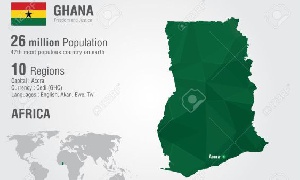Canada-based Ghanaian economic professor has shot down arguments being made in support of the creation of four new regions in the country, and cautioned President Nana Addo Dankwa Akufo-Addo not to succumb to pressures.
Professor J. Atsu Amegashie of the University of Guelph contends arguments that have been advanced so far are based purely on what he termed “dubious economic analysis,” indicating they are not backed by any informed or even anecdotal evidence.
President Akufo-Addo in the run up to the December 7, 2016 elections promised to create a new region, Western North, out of the current Western Region to ensure a more equitable distribution of resources.
On January 11, 2017, he announced his government would spearhead the creation of four new regions beginning 2018 to make 14, the total number of regions in Ghana.
He justified that by saying “the process of devolution of power will require that we look again at the regional structures of our country all with the aim of trying to promote rapid development of Ghana…”
He consequently created the Ministry of Regional Re-organization and Development and placed Dan Kweku Botwe at the helm of affairs.
At his vetting, Mr. Botwe suggested the creation of new regions would accelerate development and address poverty.
To him, a new region will get a Regional Coordinating Council, a key development agent of the state, as well as several state institutions like the Police, Fire Service and health posts.
These institutions, he argued, would generate jobs and enhance development.
Volta Regional minister, Dr. Archibald Letsa, was also quoted to have said: “Volta Region’s length was such that it bordered a number of regions in the north to the south, thereby making it difficult for those in the northern part of the region to have access to the regional capital and its institutions of state.”
Currently, a Commission of Enquiry headed by a retired Supreme Court judge, Justice S. A. Brobbey and inaugurated by the President in October 2017 is going round the country to collate views from the public proposed four new regions.
Small region not guarantee for development
But Prof. Amegashie disagreed with the assertion by the two government officials, describing same as lacking informed evidence.
In his estimation, “splitting a region is a waste of resources and is not necessary for the development of the region”.In his analysis of the views shared on the subject, he argued that there are no evidence to suggest that the smaller a region is, the higher the level of prosperity or the lower the incidence of poverty.
He cited four provinces in Canada- Newfoundland, Prince Edward Island, Nova Scotia, and New Brunswick- which are at the bottom four as the smallest in that country, to buttress his point.
These four provinces, he said, are the smallest in terms of landmass, yet three of them – Prince Edward Island, Nova Scotia, and New Brunswick- have the lowest per capita GDPs.
In Ghana, he said Brong Ahafo, Ashanti, and Western regions which are the largest 4 regions by landmass, are also in the top 5 regions with the lowest incidence of poverty while Cape Coast and Upper East which belong to the bottom 3 regions by landmass, also belong to the top 5 regions with the highest incidence of poverty.
“In terms of landmass, Greater Accra is the smallest region. However, no Ghanaian of sound mind will accept the proposition that Greater Accra is the most developed region because of its small land mass,” he averred.
He explained Greater Accra gets more resource allocated to it because it is the capital city of Ghana
“The Northern region, the biggest region by landmass, is not one of the poorest regions in Ghana because of its size” he observed.
Ensure resource flows
“Clearly, if we want to reduce poverty or accelerate the pace of development in a region, we have to look at something else, not landmass. We have to look at resource flows to the region and endowments (natural resources) of the region.
He said the President could allocate more resources to a region without having to split that region.
“Should Ghana be split into two because it is difficult for people in the Northern region to come to Accra for passports, driver’s licenses, National Health Insurance Cards, etc? The answer is, of course, “no”. The solution is to build sub-agencies (branches) of the passport office, DVLA, NHIA, etc in the Northern region,” he suggested.
Creating more regions, he said would require set-up of fixed costs and a waste of resources over and above the additional resources (per capita or unit area) required to develop a region.
He has consequently cautioned Nana Akufo-Addo “not [to] play this political game [by] satisfying chiefs or pander to a segment of the electorate.
“Presidents John Rawlings and John Kufuor were re-elected without succumbing to the pressure to create regions. Nana Addo can win re-election through good economic management. This should be his focus,” he advised.
General News of Friday, 20 April 2018
Source: 3news.com

















